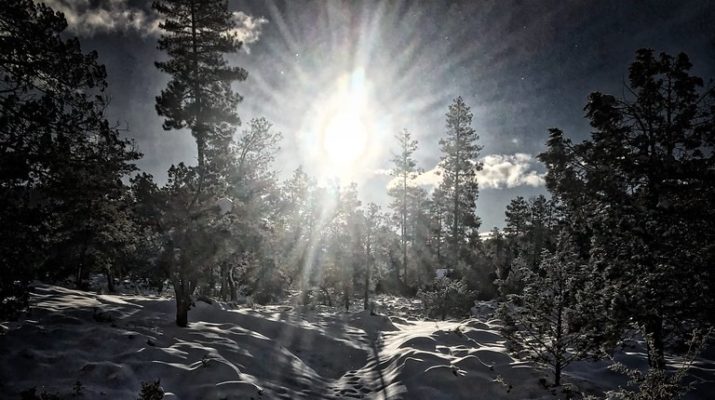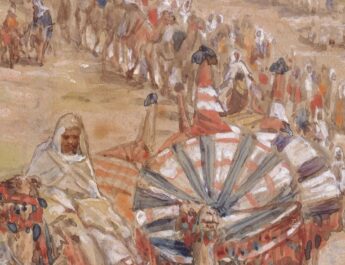Isaiah 9:2-7
Christmas Eve ABC
2 The people who walkedA in darknessB
have seen a greatC light;D
those who lived in a land of deep darkness—E
on them light has shined.F
3 You have multipliedG the nation,
you have increasedH its joy;I
they rejoiceJ before youK
as with joy at the harvest,
as people exultL when dividingM plunder.
A “walked” = halak. This is go, come, walk. It is walk literally and figuratively and includes people and animals. It can be used figuratively for one’s moral life – how we walk according to God’s way or against it. It can also refer to the walk of life as in the course one’s life takes, the choices we make, etc.
B “darkness” = choshek. From chashak (to be or become dark). This is literal darkness. It is also obscurity, misery, destruction, death, night, sorrow, and wickedness. It can refer to secret places or to distress, dread, or terror. It is symbolic of judgment, mourning, perplexity, ignorance, evil, or sin.
C “great” = gadol. From gadal (to grow up, become great, become wealthy – to advance. The root meaning may be to twist in the sense of the process of growing). This is great, high, bigger, noble, old, marvelous. It can also refer to someone who is powerful or distinguished.
D “light” = or. From or (to be or become light). This is light, sun, sunshine, dawn, or daylight. Figuratively, it can refer to light from instruction, light of a face (that is to say one that is cheerful or finds favor). It can refer to prosperity or salvation; a light that guides, a light eternal from Zion.
E “deep darkness” = tsalmaveth. 18x in OT – including Ps 23:4 “though I walk through the valley of the shadow of death.” From tsel (shadow, shade, shelter, defense, protection; used literally and figuratively) (from tsalal (to be or become dark; to cast a shade like twilight or an object that is opaque)) + maveth (death, the dead, the place of the dead; used figuratively for pestilence or ruin) (from muth (to die or be put to death; destroyer)). This word is a death-like shadow or a very dark shadow. It can refer to the grave or a severe calamity.
F “shined” = nagah. 6x in OT. This is to shine, illuminate; figuratively, can mean enlighten.
G “multiplied” = rabah. To multiply; to be or become many or great. This is an increase in any aspect: abundance, authority, excellence, quantity, length, etc.
H “increased” = gadal. Related to “great” in v2. See note C above.
I “joy” = simchah. From samach (to rejoice, be glad; properly, to brighten up; also used figuratively). This is joy, rejoicing, pleasure, or glee.
J “rejoice” = samach. Related to “joy” in v3. See note I above.
K “before you” = paneh. Literally “before your face.”
L “exult” = gil. Properly, this refers to one’s reaction to any very strong emotion – spinning around either rejoicing or as cringing in fear. This is to rejoice, be glad, be joyful, or to cry. This is part of where the name Abigail comes from.
M “dividing” = chalaq. This is to be smooth, which described the stones that were used to cast lots. Because of this connection, this verb meant dealing, dividing, sharing, distributing. In reference to the smoothness, this word is also used for flattery, particularly flattery with an ulterior motive.
4 For the yoke of their burden,
and the barN across their shoulders,O
the rodP of their oppressor,Q
you have brokenR as on the day of Midian.S
5 For all the bootsT of the trampingU warriorsV
and all the garments rolledW in bloodX
shall be burned as fuelY for the fire.
N “bar” = matteh. From natah (to stretch or spread out, extend, incline, bend). This is a staff, rod, shaft, branch, or tribe. It is a rod for chastising or correction, a scepter for ruling, a lance for throwing, a staff for walking, etc.
O “shoulders” = shekem. May be from shakam (to start or rise early; to lean one’s shoulder into a burden; literally it means to place a load on a person or animal’s back). This is the shoulder as the place of burdens. Figuratively, it is used to describe the spur of a hill. This is where the place name Shechem comes from.
P “rod” = shebet. This is a rod, staff, club, scepter, dart, or tribe. Literally a stick that can be used for punishing, writing, fighting, walking, ruling; thus, used figuratively for a clan.
Q “oppressor” = nagas. To press, drive, oppress, exact. This can also be a taskmaster, overseer or ruler. This word means to drive an animal, worker, or army. By implication, it is to tax, harass, tyrannize, or cause distress (treating people like animals).
R “broken” = chathath. Properly to prostrate and so to break apart either literally through violence or figuratively in fear and confusion. This is to break, crack, be shattered, dismayed, frightened, discourage, stand in away, or amaze.
S “Midian” = midyan. From din (to judge, defend, dispute, quarrel, strive, vindicate, govern). This is the name of a son of Abraham and Keturah, their descendants, and the place where they lived.
T “boots” = seon. 1x in OT. Probably a loan-word from Assyrian senu (a shoe or leather sandal) OR there is a Hebrew verb sa’an (to tread, tramp, booted warrior, guarded), but the verb may come from this noun. This is sandal or the boot of a soldier.
U “tramping” = raash. 17x in OT – 6x of earthquakes, 6x of rumbling or clatter, 2x of quaking in the sense of fear, 1x of the fierceness of a horse, 1x of tramping warriors, and 1x of commotion. From raash (to quake, shake, tremble, leap, make afraid, cause to tremble; this is to wave like a field of grain; to shake with fear, to leap like a locust). This is quaking, shaking, commotion, an earthquake, trembling, or confused noise.
V “warriors” = sa’an. Related to “boots” in v5. See note T above. This is to tread or tramp, to be miry or wearing soldier’s shoes – a warrior.
W “rolled” = galal. 18x in OT – 6x for rolling a stone, 3x for committing to the Lord, 2x for removing disgrace, 2x for wallowing or being rolled in blood, 2x for rolling down, 1x for having an opportunity, 1x for rolling in, and 1x for rolling up like a scroll. This is to roll literally or figuratively – to commit, remove, seek occasion, or trust.
X “blood” = dam. Perhaps from damam (to cease, be or become mute, silent, still, cut off, hold peace, be astonished, die). This is blood, bloodshed, bloodguilt, lifeblood, and death. It is used for people and animals. More often blood from a wound or the blood of the innocent. Used figuratively for violence or for wine. Closely tied to life and death.
Y “fuel” = maakoleth. 2x in OT. From akal (to eat, consume, burn up; eat in a literal or figurative sense). This is something that fire eats i.e. fuel.
6 For a childZ has been bornAA for us,
a son given to us;
authorityBB rests upon his shoulders;
and he is namedCC
WonderfulDD Counselor,EE MightyFF God,GG
Everlasting Father,HH Prince of Peace.II
Z “child” = yeled. From yalad (to bear, bring forth; can mean to act as midwife or to show one’s lineage). This is something born – so, offspring, youth, fruit.
AA “born” = yalad. Related to “child” in v6. See note Z above.
BB “authority” = misrah. 2x in OT. May be from sarah (to persist, exert oneself, persevere, contend, strive, wrestle, prevail; to have the power of a prince). This is rule, dominion, government, empire. If it is derived from sarah, this is also part of the word that makes up the name Israel (sarah + el).
CC “he is named” = qara + shem. Literally “will be called his name.” Shem may be from sum (to put, place, set). This is name, fame, renown. A name was thought to indicate something essential about a person – something about their individuality. So, this word can also mean honor, authority, or character.
DD “Wonderful” = pele. 13x in OT. This is wonder in the sense of a miracle, a marvelous thing.
EE “Counselor” = yaats. This is to counsel, advise, consult, decide, plan, purpose, determine.
FF “Mighty” = gibbor. From gabar (to be strong or mighty). This is strong, mighty, champion, chief, giant, powerful. It implies a warrior, tyrant, or hero.
GG “God” = el.
HH “Everlasting Father” = abiad. 1x in OT. From ab (father) + ad (eternity, everlasting, old; implies a duration of time either into the past or into the future).
II “Peace” = shalom. From shalam (to be complete or sound; to have safety mentally, physically, or extending to one’s estate; so, if these things are safe and complete, the implication is that one would be friendly; and, if being friendly, one would make amends and that friendship would be reciprocated). This is completeness, soundness, welfare, favor, friend, good health. It is to be safe and figuratively well, happy, at peace, friendly. Abstractly, it includes the ideas of welfare and prosperity (not in excessive wealth, but in having enough).
7 His authority shall growJJ continually,
and there shall be endlessKK peaceLL
for the throneMM of DavidNN and his kingdom.
He will establishOO and upholdPP it
with justiceQQ and with righteousnessRR
from this time onward and forevermore.
The zealSS of the LordTT of hostsUU will do this.
JJ “grow” = marbeh. 2x in OT. Related to “multiplied” in v3. From rabah (see note G above). This is abundance, increase, greatness.
KK “endless” = ayin + qets. Ayin is nothing, not at all. Qets comes from qtasats (to cut off or chop off in a literal or figurative sense). This is the outermost border or extremity, the end.
LL Literally “of the increase of his government and peace, no end.”
MM “throne” = kisse. Perhaps from kasah (to cover, clothe, close, conceal, overwhelm; to cover as clothing or for secrecy). This is a seat of honor such as a throne, a seat of authority. A throne as a seat that is canopied.
NN “David” = David. From the same as dod (beloved, love, uncle); the root may mean to boil, which is used figuratively to describe love. So, this implies someone you love such as a friend, a lover, or a close family member like an uncle. David’s name likely means something like “beloved one.”
OO “establish” = kun. To be firm, confirm, direct, faithfulness, fashion, fasten. Properly, to stand perpendicular; to set up in a literal sense (establish, prepare) or figurative (render sure, appoint, make prosperous).
PP “uphold” = saad. 12x in OT. This is support, usually used in a figurative sense. To sustain, stay, establish, comfort, uphold, refresh.
QQ “justice” = mishpat. From shaphat (to judge, defend, pronounce judgment, condemn, govern). This is a verdict or formal sentence whether from humans or from God. It includes the act of judging as well as the place that judging takes place, the suit itself, and the penalty. Abstractly, this is justice, which includes the rights of the participants.
RR “righteousness” = tsedaqah. From the same as tsedeq (rightness, righteousness, vindication. It is everything that is just or ethical. That which is right in a natural, moral, or legal sense. It also includes just weights (i.e. true weights). Figuratively, this is justice, righteousness, equity – even prosperity). This is righteousness, justice, righteous acts, and moral virtue.
SS “zeal” = qinah. May be from qana (to be jealous or zealous; provoke to jealousy) or that verb may come from this noun. This word is ardor, zeal, jealousy, envy, passion, rivalry.
TT “Lord” = YHVH. From havah (to be, become) or hayah (to come to pass, become, be). This is the name of the God of Israel, the self-existent and eternal one, the tetragrammaton. This pronunciation has been lost to time so “Lord” is generally used in its place.
UU “hosts” = tsaba. From tsaba (to wage war, serve, assemble, fight, perform, muster, wait on). This is a large group of persons (used figuratively for a group of things). It implies a campaign literally as with army, war, warfare, battle, company, soldiers. Can also be used figuratively for hardship or for worship.
Image Credit: “Seek Light” by cogdogblog is licensed under CC0 1.0




